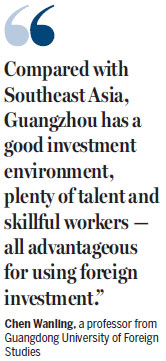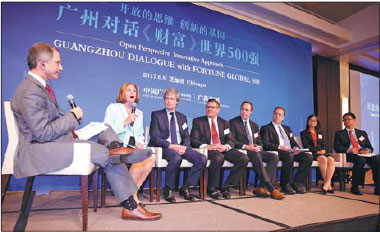Emerging industries pave Guangzhou's path to the future
Manufacturing in the city is getting an update through foreign investment and new policies
Guangzhou, capital of Guangdong province, is going all out to become "a city of innovation" in the modern era of Industry 4.0.
The city is adhering to the concepts of innovation, coordination, sustainability and openness to share in the city's economic construction and has made development of information technology, artificial intelligence and biopharmaceuticals its top priorities.
To achieve that goal, the southern metropolis will attract more foreign professionals, capital, technologies and management and expand exchanges.
The move aims to build Guangzhou, a hub of aviation and shipping in South China, into a hot destination attracting foreign talents, technologies and projects, contributing to the country's scientific innovation, Guangzhou's top officials said.

Guangzhou's effort to build a city of innovation has started to pay off, as a number of large foreign-funded projects have settled down in the city this year.
Guangzhou has also become a major destination for professionals from abroad after the city launched a special "green card" program in June of 2016. The city government said on Monday that it had issued 2,300 green cards to overseas experts in the past 12 months.
Construction of a mega biopharmaceutical project in the city has officially begun with a groundbreaking event held on June 23.
Covering an area of more than 350,000 square meters in its first stage, the bio-campus is expected to cost $800 million.
The development is being funded by the Guangzhou Development District, General Electric and other companies planning to operate at the bio-campus in the future.
The project is expected to become a leading biopharmaceutical and health industrial park and is predicted to generate from $4 billion to $8 billion in production in the following years. GE senior executive Jan Makela said GE and Guangzhou have a long-term partnership.
"Now we are very pleased to extend our partnership to life sciences and biomanufacturing," Makela said.
"Guangzhou is also a pharmaceutical export hub for China, hosting a great deal of biotech and healthcare-related industry companies.
And in the 13th Five-Year Plan (2016-20), the biopharmaceutical industry has become one of the strategic emerging industries and a key development area for Guangzhou," he added. Construction of the world's largest 8k-resolution panel factory officially began in Guangzhou's Zengcheng district in March. The project is being constructed by Sakai Display Products Corp, a subsidiary of the world's largest electronics contractor Foxconn Technology Group.
The project that costs an investment of 61 billion yuan ($8.93 billion) mainly produces the 10.5th generation panel, substrate glass and related product lines and is expected to become the world's largest and most advanced 8K processing facility.
Chen Wanling, a professor from Guangdong University of Foreign Studies, said construction of the bio-campus and the Foxconn project together indicate Guangzhou's established mature foreign investment system is still a hot destination for foreign investment helping the city attract more biopharmaceutical and IT businesses in the future. "Compared with Southeast Asia, Guangzhou has a good investment environment, plenty of talent and skillful workers - all advantageous for using foreign investment," he said.
|
With geographic advantages and a good living environment, Guangzhou in Guangdong province attracts many investors in areas including information technology, artificial intelligence and biopharmaceuticals.Photos Provided To China Daily |
|
Representatives from Fortune Global 500 companies share their views on innovation at a business forum held by the Guangzhou government in Chicago in the United States. |
(China Daily 06/28/2017 page10)
















